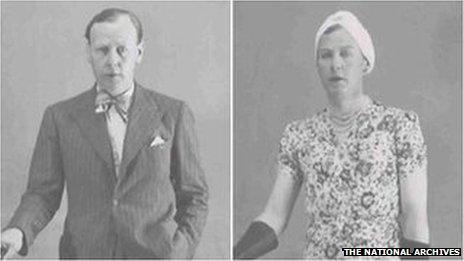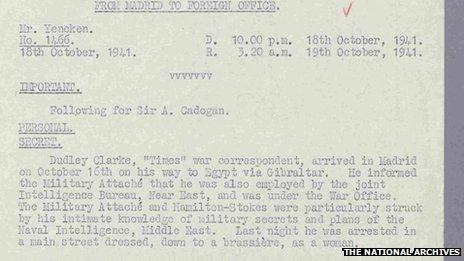Cross-dressing spy arrested while on secret mission
- Published

Lt Col Dudley Clarke, photographed by police shortly after his arrest, was considered a leading expert in military deception
One of Britain's most influential World War II spies was arrested in Madrid for cross-dressing, files released by the National Archives show.
Lieutenant Colonel Dudley Clarke was undercover as a correspondent for the Times when detained in the Spanish capital in 1941.
He was "dressed, down to a brassiere, as a woman", reports a letter from the British Embassy, external to the Foreign Office.
In 1940, he had been instrumental in establishing the British Commandos.
He is also credited with defining the Allies' deception strategy during World War II.
Field Marshall Harold Alexander, who led ground forces at D-Day as well as the Allied forces in Italy, said that "he did as much to win the war as any other single officer".
Lt Col Clarke had stopped off in Madrid in October 1941 on his way to Cairo to deliver important intelligence information to General Auchinleck, who was commander-in-chief of the Middle East command at the time.

The letter about his arrest reaveals he told Spanish police "that he was a novelist and wanted to study the reactions of men to women in the street".
As well as another outfit of women's clothes and a war correspondent's uniform, Lt Col Clarke's luggage contained "a roll of super-fine toilet paper which particularly excited the police who are submitting each sheet to chemical tests", the letter says.
The morning after his arrest, Lt Col Clarke's new explanation to British officials was that he had been "taking the feminine garments to a lady in Gibraltar and thought that he would try them on for a prank".
"This hardly squares with the fact that the garments and shoes fitted him."
'Espionage incident'
The police considered the incident a "homosexual affair" punishable by a fine, but the letter warned that the Germans "apparently think they have got on to a first class espionage incident and will certainly make the most of it".
"Jokes have already begun about 'the editor' of the 'Times' masquerading as woman."
Prime Minister Winston Churchill was informed of the incident and orders were given to get Lt Col Clarke to Gibraltar as quickly as possible, indicating both his importance to the War Office and the potential embarrassment that could have been caused.
War Office messages express hope that Lt Col Clarke's military role remains secret and his mission can be continued, because the intelligence information he possesses can only be delivered by him.
But the War Office said: "If he shows signs of mental derangement he should however be sent home by first ship."
Lt Col Clarke was released and ordered to leave Spain within 48 hours.
- Published23 May 2013
- Published23 May 2013
- Published23 May 2013